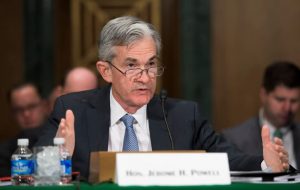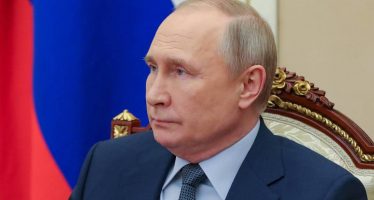Fed Chair Powell: “Recovering to a Different Economy”

Jerome Powell
A river runs through it. President Christine Lagarde of the European Central Bank (ECB) argues that safely fording the ‘big river of uncertainty’ that runs through the global economy requires a sustained fiscal and monetary effort. Major interventions by central banks and governments have been ‘extremely helpful’ to support economies and minimise lasting damage.
During a videoconference yesterday, three of the world’s top central bankers showed cautious optimism that the Corona pandemic may be inching towards the beginning of its end. US Federal Reserve Chairperson Jerome Powell welcomed this week’s news of a breakthrough in the development of an effective vaccine and suggested this may improve medium-term prospects. However, Powell warned that ‘significant challenges and uncertainties’ remain on the production and distribution of the vaccine. He said it was ‘just too soon’ the assess the economic implications of the news.
Governor Andrew Bailey of the Bank of England (BoE) shared the sentiment and emphasised that notwithstanding ‘encouraging signs’, questions remain regarding the implementation of a future global immunisation drive. Bailey did say that the arrival on the scene of a working vaccine fell within the BoE’s expectations for an ‘improved health scenario’.
Hitting Low
Powell stressed that the new normal set to arrive next year will be likely be fundamentally different from the pre-pandemic one: “We’re recovering, but to a different economy.” The Fed chair said that a substantial number of workers will need support to adapt to this new economy which he expects to be geared towards technology and automation. This, Powell argued, will be felt particularly hard in the services sector and affect its lower-paid workers disproportionally.
The Fed chair has been exceptionally outspoken on the urgent need for renewed fiscal support measures to help struggling businesses and households. At a Fed policy meeting earlier this month, Powell said that the recovery will be stronger ‘if we can just get at least some more fiscal support’. A political stalemate in Washington between President Trump and the Democrat-controlled House of Representatives has derailed plans for a third federal stimulus package.
On Thursday, senate majority leader Mitch McConnell indicated that he was no longer relying on Treasury Secretary Steven Mnuchin to cut a deal across the aisle. In Washington’s hyper-charged post-election atmosphere, many Republicans consider Mnuchin ‘too eager’ to concede to Democratic demands for a much large aid package than the one Trump Administration is willing to consider.
Senator McConnell told reporters that in light of the economic recovery underway, his party deems a targeted $500 billion stimulus bill sufficient. Democrats have proposed a package worth $2.4 trillion whilst the incoming administration of President-Elect Joe Biden has promised to move fast on a $3 trillion initiative after it takes over the federal government on January 20.
Meanwhile, House Speaker Nancy Pelosi accused Republicans of being cold-hearted for refusing to provide funds for unemployed workers, small businesses, and cash-strapped state and local governments: “It’s like the house burning down and they just refuse to throw water on it.”
Though the US unemployment rate dropped to 6.9 percent in October – down from 14.7 percent in April – the pace of the decline has slackened as the pandemic’s second wave gained traction. The US economy has managed to recoup just about half of the jobs lost since the start of the public health emergency with another 10 million or so to go.
On a Slower Roll
Fitch Ratings chief economist Brian Coulton noted that the US economy has maintained some of its forward momentum even whilst the infection rate increased sharply, although he did point to a disconcerting rise in long-term unemployment – 27 weeks or over – to 32 percent of the total.
Market watchers were encouraged by a pick-up in the rate of inflation. The core consumer price index, which excludes volatile components such as food and fuel, rose to 1.6 percent and is set to climb higher yet as households deploy their surplus, accumulated from stimulus cheques and reduced spending, over the festive season.
During August’s annual Jackson Hole monetary policy meeting, Powell signalled his intention to prioritise employment numbers over inflation concerns and vowed to keep interest rate at – or close to – their present record-low: “We are not even thinking of thinking about tightening policy.” Powell also explained that henceforward the Fed will consider the average rate of inflation over a much longer time horizon to allow for peaks to emerge well over the central bank’s 2 percent target.
Back to the Future
In a sense, Powell is returning the Fed to its original mandate of using monetary policy to secure full employment. The fed chair did, however, warn that ‘excessive inflationary pressures’ would prompt the bank to act promptly and decisively. Even so, Powell expressed his view that a ‘robust job market’ can be sustained without causing an inflationary spike.
Markets reacted by adding to the yield of long-dated Treasury debt as investors are not so sure they wish to expose their assets to inflation. With the US debt-to-GDP ratio now north of 100 percent and the Fed’s balance sheet swollen to record size, pundits have been quick to spot the danger. It would certainly not be the first time that inflation is deployed as a quick, easy, and relatively painless way to erode debt.
Europe Deflated
Such worries are virtually non-existent in Europe where the ECB may pump almost limitless volumes of fresh cash into the economy without causing so much as a ripple in the price index which remains firmly stuck in negative territory.
Earlier this week, ECB President Lagarde assured markets that financing costs across the Eurozone will remain ‘exceptionally favourable’ until the bloc’s economy begins to show signs of life. Ms Lagarde said the challenge now is to bridge the gap until the economic recovery can build momentum. The ECB is ready to expand its bond-buying programme with another €500 billion though Lagarde doubted that the bank would lower its already negative deposit rate. She expected inflation to remain negative ‘for longer than previously thought’ due to weak demand.
You may have an interest in also reading…
Power Meets Pluck: Paranoid and Haunted, President Putin Sees Nazis Everywhere
In President Vladimir Putin’s book everybody not excitedly cheering his ‘special military operation’ to liberate Ukraine is a Nazi. If
Double Dip Recession in the Making, UK Expected to Emerge First
The Deutsche Bundesbank expects a double dip recession. Analysing non-traditional indicators such as Google Map traffic data and air and
A Sci-fi Author’s View on the Rise (and Control) of Human Population
There are eight billion people on Earth, and that could rise to 10 billion by the end of the century.

















































































